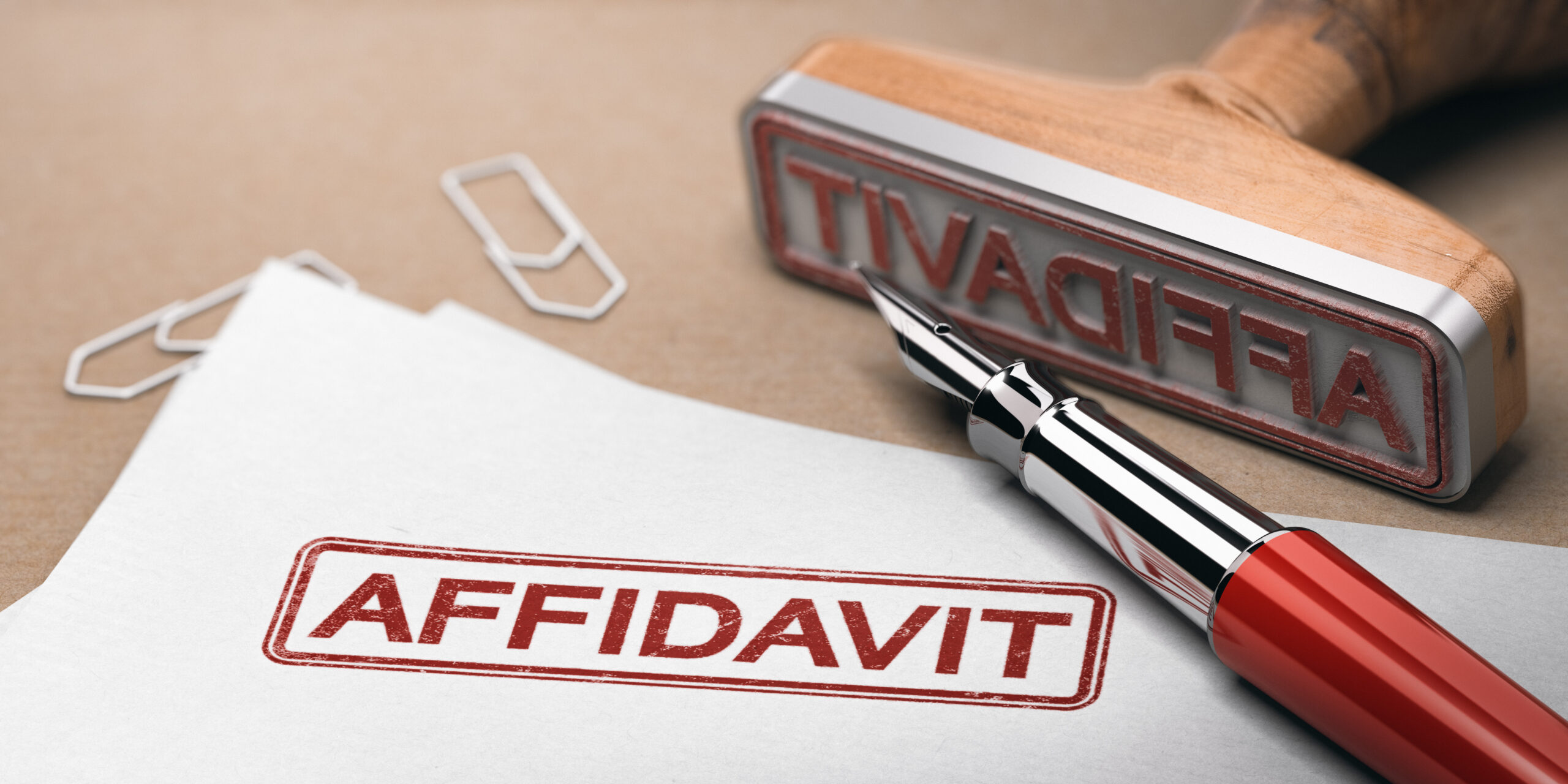Affidavits are pivotal documents in legal and administrative systems worldwide. In South Africa, for example, they are used to prove facts and make declarations under oath. They are a cornerstone of legal proceedings in courtrooms and administrative workflows, ensuring accountability and transparency in matters ranging from visa applications to financial declarations. However, many South Africans still have an abstract or misunderstood concept of an affidavit. Whether you are an individual dealing with personal matters, a business professional granting powers of attorney, or a legal team streamlining processes, it is crucial to understand how affidavits work and how they can be legalised for use in South Africa or overseas.
Learning how to use an affidavit effectively can help you to ensure that your facts are accurately represented in any formal applications or legal proceedings. This article delves into the fundamentals of affidavits under South African law, including their legal definition, importance and types, and the drafting process.
What is the actual meaning of affidavit in South Africa?
In South Africa, an affidavit is a written statement made under oath, in which the person making the statement (known as the ‘deponent’) swears that the contents are true to the best of their knowledge. It is a formal way of providing factual information or evidence to a court or administrative body. In South Africa, affidavits can be made in the presence of a Commissioner for Oaths, a notary public, or at any police station, where an officer will provide a standard form and assist with completion. Once notarised or sworn, the affidavit becomes legally binding and admissible in legal and administrative proceedings.
An affidavit does not have a set expiration date like a driver’s license. Its validity is determined by whether the information it contains remains accurate and relevant. If the facts in the affidavit change, or if the purpose for which it was originally created no longer exists, the affidavit may no longer be considered valid.
This document is of great significance in legal and administrative proceedings, as all statements made under oath are considered truthful and binding.
It is important to note that while affidavits are valuable pieces of evidence, they are not immune to scrutiny. In legal or administrative proceedings, the integrity and veracity of an affidavit can be challenged by the receiving authority.
Essential features of an affidavit
The following are the essential features of an affidavit:
- Written format: An affidavit must be in written form, either typed or handwritten.
- Individual’s Declaration: An Affidavit can only be created by an individual and not by any legal entity such as corporations, associations, or groups of individuals.
- Clear and concise language: The content should be factual, straightforward, and free from opinions or argumentative statements.
- Proper identification: The deponent’s full legal name, address, and sometimes occupation must be clearly stated.
- Notarization: The affidavit must be signed in the presence of an authorized officer, typically commissioner of oaths or a notary public, who verifies the deponent’s identity.
- Oath or affirmation: The deponent must swear an oath or make an affirmation regarding the truthfulness of the statements.
- Signature: The deponent must sign and date the document.
- Compliance with jurisdiction requirements: Depending on its purpose, an affidavit may require further legalisation. This could be an apostille for international use.
Structure of an Affidavit
1. Title – The document should be titled “Affidavit” to clearly indicate its nature.
2. Identity Statement – The following paragraph introduces yourself and provides information about your identity (age, address, etc.)
3. Truth Statement – You will swear in this section that the information provided is correct and true to the best of your knowledge.
4. Fact Statement – The paragraph(s) that follow will contain your factual statement. Each paragraph should only contain one fact and the details that pertain to it.
5. The Final Statement of Truth – After you’ve finished stating your facts, you will swear once more that the information provided above is correct.
6. Sign and Notarize – The last section contains signature lines for you, witnesses, and the notary or commissioner of oaths, along with the date.

Commonly used affidavits in South Africa
Affidavits come in various forms, each tailored to specific legal circumstances. Some common uses of affidavits are as follows:
General Affidavit
A general affidavit is a sworn written statement of facts that can be used in various legal and personal situations to confirm information or events. Unlike affidavits with specific purposes, such as proving residence or supporting immigration, it is a versatile document that can be tailored to specific needs.
Affidavit of financial support for student
Most countries require proof that a student has sufficient funds to cover their tuition fees and living expenses. An affidavit of support for a student visa serves as evidence of this financial backing. As part of a student visa application, an affidavit of support may be requested to demonstrate that the student will receive financial assistance from their family during their programme of study.
Proof of residence Affidavit
This affidavit is used to confirm an individual’s place of residence for legal or administrative purposes. It confirms the deponent’s place of residence and can be used for matters such as immigration, school enrolment or legal notices.
Single status affidavit
An Affidavit of Single Status is a sworn statement that confirms an individual’s unmarried status. It includes information such as the person’s full name, date of birth, current address, and marital status. This document is sometimes called an Affidavit of No Impediment to Marriage, a Certificate of Freedom to Marry, or a Single Status Affidavit.
Legalisation of Affidavits for international use
‘Legalisation’ is an umbrella term for the process of making a document suitable for legal and formal use in another country. For any affidavit to be used outside South Africa, the country of use usually requires the document to be signed in the presence of a notary public. The notary’s role is to verify the identity of each deponent and assess their legal capacity and understanding of the affidavit.
Once the affidavit has been notarised, an apostille may also be required, depending on whether the destination country has signed the Hague Apostille Convention. This will enable the foreign country to accept the affidavit as a validly signed document. It certifies the authenticity of a public officer’s signature and/or seal, such as that of a South African notary public. Failure to obtain an apostille when needed may result in your affidavit being rejected. It acts as a ‘fast-track’ version of legalisation.
Additionally, if the affidavit is intended for use in a country where English is not the primary language, a translation of the affidavit and apostille may be required.
 Understanding the Importance of an Affidavit and Its Legal Implications
Understanding the Importance of an Affidavit and Its Legal Implications
Affidavits carry significant legal weight and consequences:
- Legal accountability: By signing an affidavit, the deponent becomes legally accountable for the truthfulness of the statements made.
- Perjury risk: False statements made in an affidavit can lead to charges of perjury, which is a criminal offense punishable by fines and/or imprisonment.
- Evidentiary value: Courts generally give substantial weight to properly executed affidavits, particularly when the deponent is unavailable to testify in person.
- Procedural significance: Many legal proceedings cannot advance without the submission of required affidavits.
- Binding effect: Once executed, an affidavit creates a permanent record that may be difficult to contradict or withdraw.
What next?
Global Apostille is experienced in notarising, apostilling and legalising affidavits for international use. For more information on our services please contact us. Tel: 012 348 3134| Mobile: 081 347 6060 | Email: info@apostillelegalisation.co.za
FAQs about affidavits
1.Can I draft my own affidavit?
In short, yes. Although it can seem simple to create your own affidavit, it’s always advised to use a notary public to avoid easy but costly mistakes.
2.Where can I certify an affidavit in South Africa?
In South Africa, you can have an affidavit certified (i.e. swear or affirm its contents before an authorised person) at a police station, with a notary public or a Commissioner for Oaths. These professionals will witness you signing the document and administering the oath or affirmation. If you intend to use the affidavit outside South Africa, you often need to get it notarised by a notary public.
3.How long is an affidavit valid in South Africa?
Unlike a driving licence, an affidavit does not have a set expiry date unless this is specified. Its validity depends on whether the information it contains remains accurate and relevant.
4.Can an affidavit be used as a will?
No, an affidavit cannot be used as a will in South Africa. While an affidavit is a sworn statement that can be used in legal proceedings, it does not meet the specific requirements of a valid will under South African law


 Understanding the Importance of an Affidavit and Its Legal Implications
Understanding the Importance of an Affidavit and Its Legal Implications






